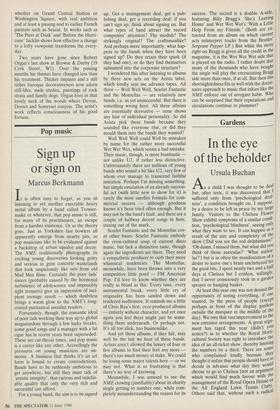Pop music
Sign up or sign on
Marcus Berkmann
It is often easy to forget, as you sit listening to yet another execrable heavy metal album by a band called Trouser- snake or whatever, that pop music is still, for many of its practitioners, an escape from a harsher existence. Or so the theory goes. Just as Yorkshire fast bowlers all apparently emerge from nearby pits, so pop musicians like to be evaluated against a backdrop of urban squalor and decay. The NME traditionally photographs its exciting young discoveries looking gritty and serious in grim concrete wastelands that look suspiciously like sets from old Mad Max films. Certainly the poor lads' sneers (probably caused by the hormonal turbulence of adolescence and impossibly tight trousers) give an impression of inci- pient teenage revolt — which doubtless brings a warm glow to the NME's long- coated puritanical socialist readers.
Fortunately, though, the romantic ideal of poor lads working their way up to global megastardom through a few lucky breaks, some good songs and a manager with a fat cigar has in recent years been superseded. These are cut-throat times, and pop music is a career like any other. Accordingly the pressures on young musicians are im- mense. A business that thinks it's an art form is bound to create contradictions. Bands have to be ruthlessly ambitious to get anywhere, but still they must talk of 'artistic integrity', that curious and indefin- able quality that only the very rich and successful can afford.
For a young band, the aim is to be signed up. Get a management deal, get a pub- lishing deal, get a recording deal: if you can't sign up, think about signing on. But what types of band attract the record companies' attention? The modish? The strikingly original? The craftsmanlike?
And perhaps more importantly, what hap- pens to the bands when they have been signed up? Do they retain their spark (if they had one), or do they find themselves subsumed into the corporate structure?
I wondered this after listening to albums by three new acts on the Arista label, which kindly sent me advance tapes. All three — Well Well Well, Scarlet Fantastic and the Montellas — are relatively new bands, i.e. as yet unsuccessful. But there is something wrong here. All three albums are essentially derivative — none shows any hint of individual personality. So did Arista pick these bands because they sounded like everyone else, or did they mould them into the bands they wanted?
Well Well Well could Well be mistaken by name for the rather more successful Wet Wet Wet, which seems a bad mistake. Their music, though, is more bombastic — not unlike U2, if rather less distinctive. Unfortunately there are millions of young bands who sound a bit like U2, very few of whom ever manage to transcend faithful imitation. Perhaps I'm missing something, but simple emulation of an already success- ful act (with little new to show for it) is rarely the most surefire formula for com- mercial success — although goodness knows it's been tried often enough. But it may not be the band's fault, and there are a couple of halfway decent songs in here, staring out of the murk.
Scarlet Fantastic and the Montellas cov- er other bases. Scarlet Fantastic embody the cross-cultural soup of current disco music, but lack a distinctive taste, though again the ingredients are there. They need a sympathetic producer to curb their more whimsical tendencies. The Montellas, meanwhile, have been thrown into a very competitive little pond — FM American Pop. I'd love to know whether they are really as bland as this. Every tune, every instrumental break, every little cry of originality has been sanded down and rendered inoffensive. It reminds me a little of Chris Rea's first, over-produced albums — entirely without character, and yet once again you feel there might just be some- thing there underneath. Or perhaps not. It's all too slick, too businesslike.
And yet these albums, if they fail, may well be the last we hear of these bands.
Artists aren't allowed the luxury of four or five albums to find their feet any more — there's too much money at stake. We could be losing some major talents here — or we may not. What is so frustrating is that there's no way of knowing.
Meanwhile, I was amused to see the NME crowing (justifiably) about its charity single getting to number one, while com- pletely misunderstanding the reason for its success. The record is a double A-side, featuring Billy Bragg's 'She's Leaving Home' and Wet Wet Wet's 'With a Little Help From my Friends.' (Both are ex- tracted from an album on which current acts reinterpret tracks from the Beatles Sergeant Pepper LP.) But while the more right-on Bragg is given all the credit in the magazine, it is the Wet Wet Wet side that is played on the radio. I rather doubt that many of the thousands who have bought the single will play the excruciating Bragg side more than once, if at all. But then this shortsightedness fits in well with the doctri- naire approach to music that inkies like the NME enforce out of arrogant habit. Who can be surprised that their reputations and circulations continue to plummet?


































































 Previous page
Previous page